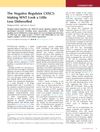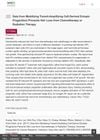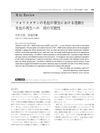 48 citations,
June 2013 in “Journal of Dermatological Science”
48 citations,
June 2013 in “Journal of Dermatological Science” Valproic acid may help hair grow and could be a safe treatment for hair loss.
 38 citations,
October 1988 in “Clinics in Dermatology”
38 citations,
October 1988 in “Clinics in Dermatology” Hormones, nutrition, and seasonal changes regulate hair growth cycles, with androgens extending growth phases and factors like aging and malnutrition affecting hair loss and thinning.
 7 citations,
February 2018 in “Journal of Investigative Dermatology”
7 citations,
February 2018 in “Journal of Investigative Dermatology” Fat tissue and a specific protein are crucial for healthy hair growth and maintenance.
 4 citations,
February 2018 in “Journal of Investigative Dermatology”
4 citations,
February 2018 in “Journal of Investigative Dermatology” The document concludes that a protein involved in hair growth may link to baldness and that more research is needed on its role in hair loss and skin cancer treatments.
 3 citations,
May 2022 in “Experimental Dermatology”
3 citations,
May 2022 in “Experimental Dermatology” Misbehaving hair follicle stem cells can cause hair loss and offer new treatment options.
 January 2022 in “Clinical Cases in Dermatology”
January 2022 in “Clinical Cases in Dermatology” Lack of certain nutrients may contribute to hair loss and proper diet or supplements could improve it.
January 2016 in “MRIMS Journal of Health Sciences” Good cultural practices and proper nutrition can prevent hair loss in girls.
 December 2010 in “Bariatric Nursing and Surgical Patient Care”
December 2010 in “Bariatric Nursing and Surgical Patient Care” Hair loss after bariatric surgery can be reduced by staying hydrated, eating enough protein, taking vitamins, managing stress, and possibly using biotin.
51 citations,
August 2013 in “The Journal of experimental medicine/The journal of experimental medicine” Loss of a specific protein in skin cells causes symptoms similar to psoriasis.
 15 citations,
January 2015 in “Skin Pharmacology and Physiology”
15 citations,
January 2015 in “Skin Pharmacology and Physiology” Parathyroid hormones are important for hair growth, but their use in treating hair loss from chemotherapy is still uncertain.
 11 citations,
September 2010 in “American Journal of Medical Genetics - Part A”
11 citations,
September 2010 in “American Journal of Medical Genetics - Part A” A Turkish family with sparse hair and eyebrow loss has a mutation in the U2HR gene linked to Marie Unna hereditary hypotrichosis.
 8 citations,
September 2017 in “Journal of Investigative Dermatology”
8 citations,
September 2017 in “Journal of Investigative Dermatology” CXXC5 is a protein that prevents hair growth and could be a target for hair loss treatment.
 6 citations,
January 2013 in “Genetics and Molecular Research”
6 citations,
January 2013 in “Genetics and Molecular Research” Women with hair loss have more androgen receptors in certain hair follicles.

Activating certain cells in hair follicles can prevent hair loss caused by cancer treatments.
 9 citations,
August 2015 in “Tissue Engineering and Regenerative Medicine”
9 citations,
August 2015 in “Tissue Engineering and Regenerative Medicine” Human skin cell byproducts can potentially be used to treat hair loss and promote hair growth.
 6 citations,
March 2019 in “The American Journal of Dermatopathology”
6 citations,
March 2019 in “The American Journal of Dermatopathology” Amyloid deposits linked to a type of protein may cause a unique pattern of hair loss by disrupting hair growth cycles.
1 citations,
July 2021 in “Fayoum University Medical Journal” Men with hair loss have lower vitamin D levels.
 April 2021 in “Current Topics in Nutraceutical Research”
April 2021 in “Current Topics in Nutraceutical Research” Citron seed oil may help prevent or treat hair loss by promoting hair growth and increasing hair density.
 January 2004 in “Enshou saisei”
January 2004 in “Enshou saisei” Follistatin is important for hair growth and could help treat hair loss.
January 2023 in “International journal of dermatology, venereology and leprosy sciences” Low levels of vitamin D and ferritin may increase the risk of female pattern hair loss.
 28 citations,
July 2008 in “Developmental Biology”
28 citations,
July 2008 in “Developmental Biology” Smad4 is important for healthy hair follicles because it helps produce a protein needed for hair to stick together and grow.
 23 citations,
February 2015 in “International Journal of Molecular Sciences”
23 citations,
February 2015 in “International Journal of Molecular Sciences” Colchicine can inhibit hair growth by affecting cell activity and protein expression in hair follicles.
 7 citations,
January 2010 in “Pharmacognosy Research”
7 citations,
January 2010 in “Pharmacognosy Research” The tobacco leaf extract may help hair grow and could treat hair loss.
 2 citations,
April 2012 in “Science-business Exchange”
2 citations,
April 2012 in “Science-business Exchange” Blocking a protein called prostaglandin D2 might help treat hair loss.
 January 2022 in “Journal of St. Marianna University”
January 2022 in “Journal of St. Marianna University” Substances from human hair cells can affect hair loss-related genes, potentially leading to new treatments for baldness.
 January 2021 in “Faculty Opinions – Post-Publication Peer Review of the Biomedical Literature”
January 2021 in “Faculty Opinions – Post-Publication Peer Review of the Biomedical Literature” Aging affects the cells around hair follicles, which may influence female pattern hair loss and treatment options.
September 2019 in “Journal of Investigative Dermatology” Silibinin may help promote hair growth and treat hair loss.
 1 citations,
November 2022 in “Research Square (Research Square)”
1 citations,
November 2022 in “Research Square (Research Square)” A protein called HIF-1a helps control hair growth genes and could be targeted to treat hair loss.
 November 2023 in “Cell Proliferation”
November 2023 in “Cell Proliferation” A protein from fat-derived stem cells, DKK1, is linked to hair loss and blocking it may help treat alopecia areata.
 September 2017 in “The journal of investigative dermatology/Journal of investigative dermatology”
September 2017 in “The journal of investigative dermatology/Journal of investigative dermatology” Scarred skin in lichen planopilaris loses immune cells due to a decrease in a specific protein in skin cells.

























